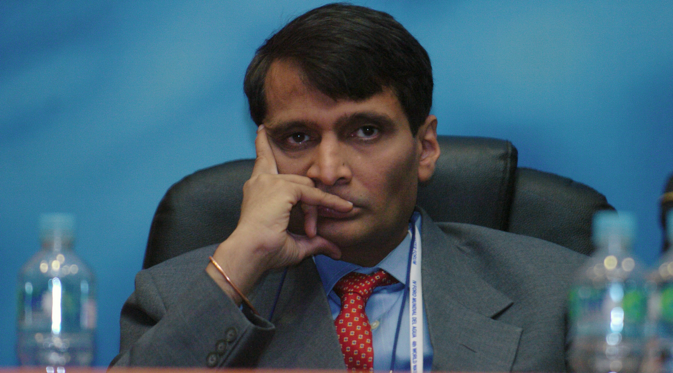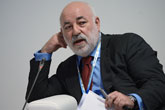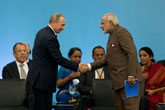G20 should be a forum for inclusion, not exclusion - India's Sherpa

Suresh Prabhu: "India and Russia have a huge potential agenda." Source: www.iisd.ca
Russia finally confirmed its participation in the upcoming G20 summit in Australia after a month-long controversy. What is India’s position on this issue?
The world needs to get integrated in a way that we reduce the differences. We should always use any forum that provides an opportunity to exchange ideas about why these differences exist.
Russia currently is passing through a stage when some of other powers in the world are raising issues related to her role in (her) neighbourhood. I feel that G20 is a forum wherein all the 20 countries are working in a way to solve the global problems or challenges that face each one of them. Therefore, G20 should be a forum for inclusion, not for exclusion of any of its members. This only will give an opportunity to discuss any issues that confront us including Russia’s role in the neighbourhood.
What are the most important issues for India this time at G20?
India is very concerned about the falling employment globally. We have been witnessing how the growth that takes place in the world does not necessarily result into creation of the jobs and employment. The G20 is also facing a similar challenge. We have been witnessing the phenomena called jobless growth. Particularly in last 30 years, the global economy has expanded at unprecedented scale, of course thanks to some of the countries in Asia that are faster than rest of the World, particularly China and India but this growth has not necessarily created job opportunities for the people.
People are not interested in the numbers of growth. These numbers do not mean anything to them unless it improves their livelihood, their standard of life. Therefore, the G20 has set an ambitious target of increasing the growth by 2 percent in the five years. That should result into more employment creation.
Then G20 grouping has also an obligation to work for the good of rest of the world. G20 is only 20 countries and they have more than 90 percent of the GDP of the world but there are less than 10 percent of the GDP which is shared by almost 200 countries in the world. So we really need to find out how the 20 will take care of 200. We also must work in a way that global community should address the challenges of the whole world and not just of these 20 countries. They should look at their own interest but also at the interest of those who are not going to be present on a table at G20.
India did not support Western sanctions against Russia. Why?
India feels that any decision that is taken on any of this issue should be taken in multilateral forums like United Nations for example. So sometimes, decisions are politically motivated.
I personally feel that we should understand the reasons behind any action. That is why India is promoting multilateral action.
Then some countries take different stands at different times. No country should be subjected to discrimination of any kind wherein the feel to be motivated by our narrow personal interest by taking multilateral decision.
India says the world is becoming multipolar. What does it mean for India and how it is planning to act in this multipolar world?
We have to understand the position of India very correctly. India is one country which has promoted the concept of Vasudhaiva Kutumbakam. This is an old concept - not just in last 60-70 years after independence - a part of our philosophy, which means the world is one community. Indian philosophy, which is many times misconstrued as a religion, is a concept of how do you work together as a humanity going beyond the borders that have been created in the last few hundred years. So the concept of India is that promote the good of the humanity. Now this being a philosophy driving India’s existence in this global community, we feel that all countries should be treated equally but unfortunately, that does not happen like that because concept and reality are different.
The real world is a different thing. There are national boundaries and interests, regional conflicts and interests. So what we believe in that is that we are friends across the world. For example, marriage to a particular woman means you shouldn't have more wives, but friendship is not marriage. Marriage to one person but friendship with many others is something which means that we believe in the concept of relationship and relationship of a different kind. So India’s engagement with the world community is not necessarily means at the expense of others. Russia particularly has been our age-old friend.
We value this friendship which is unique in nature which has developed over a period of time. India considers Russia as a very unique and very valuable friend. Does that mean that we should not have friends with others? No. We have friendship with all our neighbours, we want to develop friendship with major players and that is how our president met the Chinese and American presidents recently, he also visited Japan. Then he will be in Australia. It does not mean that we are trying to dump any relationship.
We feel that our friendship with many countries means multipolar world and that is what we really mean, that not dependent on one but independent of anybody, dependent as a friend but independent of every relationship.
So now we are looking forward to the visit of Russian President to India in December and we hope we forge a real good relationship with Russia which will be far better than our historical relationship. The future becomes us, the past guides us, the present reminds us about our responsibilities.
What positive results should we expect from Vladimir Putin's visit?
We feel there should be a proper agenda prepared for his visit. There are many admirers of Vladimir Putin in India because we know how strongly he has supported India in the past. India’s defence capability has also been strengthened by Russia.
So we should prepare a comprehensive economic social political strategic agenda. We should think how to make rouble rupee trade not ‘trouble rupee trade.’ So rouble should be replaced with no trouble for each other and we can work together.
India and Russia have a huge potential agenda. In fact, this visit of Russian president will be one of the important milestones in terms of building new possibilities of cooperation between Russia and India. So we will look forward to the visit of President Putin.
Could you suggest some steps for pushing this trade agenda forward?
We have missed an opportunity. I must say that 1991 post emergence of independent countries, in the erstwhile USSR and when the CIS was created, India and Russia have not become as close as they should be, as close as USSR and India were. So we must catch up first. We have lost too much of time in the last 20-22 years. We should very quickly work on creation, new opportunities. Trade is one of the important means of linking the countries and the societies. So we must very quickly work on what time lost. What has gone has gone, cannot get back. Time and tides cannot be recreated. So what has gone we should find out why but we should not bother about that now because that will not help anybody but to work on creating new opportunities between India and Russia and in areas like innovation, technology, education, healthcare, infrastructure, energy are many big areas in which India and Russia can work together.
Earlier you became a partner of Russian Skolkovo Foundation for innovations? Can you recall some projects in this area that Russia and India will be able to do together?
Water is one area, renewable energy is other area. Third area is energy efficiency. Fourth area is infrastructure, how to create good infrastructure. I was very impressed when in Russia any small restaurant you go, you can use WiFi free, why not we use that idea here and connectivity can really transform India. So there are many areas particularly in these areas of water, environment, energy, infrastructure. So those should be the areas of innovation.
What do you think about Russia-China-India gas pipelines and Russia-India oil pipeline?
We welcome this because no one is more dependent on gas and oil like India is. So if we can bring a gas through pipeline, this is the best thing that can happen and therefore, we must find out and Russia has done that great deal with China. So we should look at all these options. India has already invested in Sakhalin and would like to invest more into such assets and pipeline is a fantastic idea. Afghanistan as you know is very uniquely located country facing lot of challenges but at the same time, India would be very very happy to work on this.
(This interview was condensed and edited for clarity)
All rights reserved by Rossiyskaya Gazeta.
Subscribe
to our newsletter!
Get the week's best stories straight to your inbox


